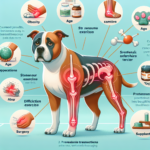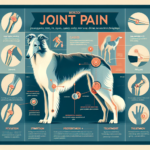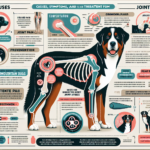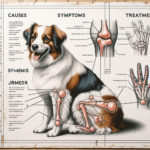Cairn Terrier Joint Pain: Causes, Symptoms, Prevention, and Treatment
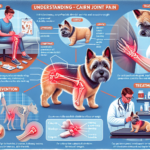
Introduction
The Cairn Terrier is a small, spirited breed known for its tenacity and lively personality. Originating from the Scottish Highlands, this breed was initially used for hunting and burrowing into cairns (rock piles) to flush out small game. With a history dating back to the 16th century, the Cairn Terrier is one of the oldest terrier breeds. They are characterized by their sturdy build, weather-resistant coat, and expressive eyes. Despite their small size, Cairn Terriers are robust and energetic, making them excellent companions for active families.
Like many breeds, Cairn Terriers are prone to certain health issues. Common concerns include skin allergies, eye problems, and joint pain. Joint health is particularly crucial for this breed due to their active nature and genetic predispositions. Ensuring good joint health can significantly enhance their quality of life and longevity.
Breed-Specific Joint Pain Risks
Genetic Predisposition
Cairn Terriers, like many purebred dogs, have a genetic predisposition to certain joint-related issues. Hip dysplasia, a condition where the hip joint doesn’t fit properly into the hip socket, is one such concern. This can lead to arthritis and significant pain over time. Elbow dysplasia, another genetic condition, affects the elbow joint and can cause similar issues. Additionally, Cairn Terriers may be prone to patellar luxation, where the kneecap dislocates from its normal position.
Age-Related Risks
As Cairn Terriers age, the risk of developing joint pain increases. While they are generally healthy dogs, the wear and tear on their joints from years of activity can lead to conditions like osteoarthritis. Owners should be particularly vigilant as their dogs approach middle age (around 7-8 years) and senior years (10+ years), as these are common times for joint issues to manifest.
Activity Level and Joint Stress
Cairn Terriers are known for their high energy levels and love for physical activity. Whether it’s chasing a ball, digging, or going for long walks, their active lifestyle can put significant stress on their joints. While exercise is essential for their overall health, excessive or high-impact activities can exacerbate joint problems, especially if they are genetically predisposed to such issues.
Common Symptoms of Joint Pain in Cairn Terriers
General Symptoms
- Limping: One of the most noticeable signs of joint pain is limping or favoring one leg over another.
- Stiffness: Dogs may show stiffness, especially after resting or sleeping.
- Reluctance to Move: A dog in pain may be hesitant to jump, climb stairs, or even go for walks.
- Swelling: Inflammation around the joints can cause visible swelling.
- Behavioral Changes: Irritability, lethargy, or changes in appetite can also indicate discomfort.
Breed-Specific Symptoms
In Cairn Terriers, joint pain may manifest in specific ways due to their size and build. Owners might notice a reluctance to engage in activities they once enjoyed, such as digging or playing fetch. Additionally, they may exhibit a “bunny hop” gait, particularly if hip dysplasia is the issue. Given their expressive nature, changes in their usual spirited behavior can also be a red flag.
When to Consult a Vet
If you observe any of the above symptoms in your Cairn Terrier, it’s essential to consult a veterinarian promptly. Early intervention can prevent further deterioration and improve your dog’s quality of life. Persistent limping, noticeable pain, or significant behavioral changes should not be ignored.
Preventive Measures for Joint Health
Exercise Recommendations
Regular, moderate exercise is crucial for maintaining joint health in Cairn Terriers. Activities like walking, swimming, and gentle play are excellent choices. Avoid high-impact exercises such as jumping or running on hard surfaces, as these can exacerbate joint issues. Consistent, low-impact activities help keep the joints flexible and muscles strong without causing undue stress.
Dietary Suggestions
A balanced diet rich in essential nutrients can support joint health. Foods high in omega-3 fatty acids, such as fish oil, can reduce inflammation. Supplements like glucosamine and chondroitin are also beneficial for maintaining cartilage health. Always consult your veterinarian before adding supplements to your dog’s diet to ensure they are appropriate and safe.
Weight Management
Maintaining a healthy weight is critical for reducing joint stress. Excess weight puts additional pressure on the joints, exacerbating pain and potentially leading to further complications. Regularly monitor your Cairn Terrier’s weight and adjust their diet and exercise routine as needed to keep them at an optimal weight.
Early Screening and Monitoring
Regular veterinary check-ups are essential for early detection of joint issues. Screening tests such as X-rays can identify problems like hip dysplasia before they become severe. Early intervention strategies, including lifestyle adjustments and medications, can significantly improve outcomes.
Treatment Options for Joint Pain
Non-Surgical Treatments
For many Cairn Terriers, non-surgical treatments can effectively manage joint pain. These may include:
- Medications: Anti-inflammatory drugs and pain relievers can help manage symptoms.
- Physical Therapy: Exercises and treatments designed to improve joint function and reduce pain.
- Lifestyle Adjustments: Modifying activity levels and incorporating joint-friendly exercises.
Surgical Options
In severe cases, surgical intervention may be necessary. Common surgeries for joint issues include:
- Hip Replacement: Replacing the damaged hip joint with an artificial one.
- Arthroscopy: A minimally invasive procedure to clean out the joint.
- Osteotomy: Cutting and realigning bones to improve joint function.
These surgeries can significantly improve quality of life but should be considered carefully with your veterinarian.
Alternative Therapies
Alternative treatments can also be beneficial for managing joint pain in Cairn Terriers. Options include:
- Acupuncture: Can help reduce pain and improve joint function.
- Hydrotherapy: Water-based exercises that reduce joint stress while improving strength.
- Massage: Helps improve circulation and reduce muscle tension around the joints.
Lifestyle and Management Tips
Daily Care Routine
A consistent daily care routine can help manage joint pain in Cairn Terriers. This might include:
- Morning and evening walks to keep joints flexible.
- Regular, gentle play sessions to maintain muscle strength.
- Administering any prescribed medications or supplements.
- Monitoring weight and adjusting diet as needed.
Modifying the Home Environment
Making your home more comfortable for a dog with joint pain can significantly improve their quality of life. Consider the following modifications:
- Ramps: Use ramps instead of stairs to reduce joint strain.
- Orthopedic Beds: Provide supportive bedding to alleviate pressure on joints.
- Non-Slip Flooring: Ensure floors are non-slip to prevent falls and injuries.
Long-Term Management
Long-term management of joint pain involves a combination of regular veterinary care, appropriate exercise, a balanced diet, and a supportive home environment. Consistency is key to keeping your Cairn Terrier active and happy despite joint issues. Regular check-ups and adjustments to their care routine as they age will help manage their condition effectively.
FAQs About Cairn Terriers and Joint Pain
What are the early signs of joint pain in Cairn Terriers?
Early signs include limping, stiffness, reluctance to move, and behavioral changes such as irritability or lethargy. If you notice any of these symptoms, consult your veterinarian promptly.
Can joint pain in Cairn Terriers be prevented?
While genetic predispositions cannot be entirely prevented, maintaining a healthy weight, providing appropriate exercise, and regular veterinary check-ups can significantly reduce the risk and severity of joint pain.
Are there specific foods that can help with joint health?
Yes, foods rich in omega-3 fatty acids, glucosamine, and chondroitin can support joint health. Always consult your veterinarian before making dietary changes or adding supplements.
Is surgery always necessary for joint pain in Cairn Terriers?
No, surgery is typically considered a last resort. Many cases of joint pain can be managed with non-surgical treatments such as medications, physical therapy, and lifestyle adjustments.
How often should I take my Cairn Terrier to the vet for joint health check-ups?
Regular check-ups are essential, especially as your dog ages. Annual visits are recommended, but more frequent visits may be necessary if your dog shows signs of joint pain or has a known predisposition to joint issues.
Conclusion
Joint health is a critical aspect of caring for a Cairn Terrier. Understanding the breed-specific risks, recognizing early symptoms, and taking preventive measures can significantly enhance your dog’s quality of life. Regular veterinary care, appropriate exercise, a balanced diet, and a supportive home environment are key to managing joint pain effectively. By staying vigilant and proactive, you can ensure your Cairn Terrier remains active, happy, and healthy for years to come.
Remember, always consult your veterinarian for personalized advice and treatment options tailored to your dog’s specific needs. Taking these steps will help you provide the best care for your beloved Cairn Terrier.

